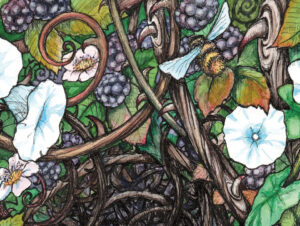Richie McCaffery reviews The Slowing Ride by Will Stone (Shearsman, 2020)
There is a distinctly seer-like and timely quality to the poems in this, Will Stone’s fourth collection. The tacitly eschatological import of these poems comes across not only in the title – The Slowing Ride – and front cover image of a broken porcelain portrait on a long-neglected gravestone (a photograph from a series by the poet called ‘Fragmented Remembrance’), but also in poems that imagine a dystopian future. Murders of rooks and crows recur as portents and indicators of a diseased culture. ‘Blood Fridge’ presents a bucolic image of England in the future where people wait “patiently by the blood fridge”. Nothing is explained and the dark mystery of it all takes root in the reader’s mind. In ‘Latecomers’ we are told that “Nature, the patient persistent labourer / […] does not look up as we pass”. The opening poem, ‘The Song of the West’ casts an entropic shadow over the rest of the collection by letting us know that humanity is in for a fall:
The stranger passed behind leaded lights
in the weft of forebodings, he stayed on
as another’s fingers ran like frightened deer
across the keys, with pure instinct
then suddenly slowed, in time
each creature senses our downfall.
Stone is in no way an inwardly looking and nationalist poet and the Britain of his poetry, though shot through with tender and reverential nods to countryside poets of the past like Edward Thomas, is less a ‘Sceptred Isle’ than a ‘Septic’ one, particularly as Brexit seems to have kindled such naked bigotry. Stone’s epigraph (translated from Zweig) is telling: “One can belong to a people but when the people fall prey to insanity one is not obliged to remain in the same time as them”. Stone’s outlook is unapologetically European, a literary flâneur and translator at home equally in Italy, Belgium, Switzerland and France. This also makes of him something of a poète maudit, as many of our nation’s favourite poets are firmly poets of a specific place. Stone as such has a profound awareness of the history of Europe, of otherwise civilised nations launching themselves into a maelstrom of murderous political violence and the ogrish spectre of Nazism and the Holocaust is never far away in these poems. I’m reminded of the prophetic words of the Scottish poet George Campbell Hay, warning his readers of the risk of history (World War Two) repeating itself:
What crime was it we suffered for?
They started it. We willed no war.
Listen to yourselves. Beware.
We hear, in ‘The Guiltless’, of acts of resistance and heroism such as that of Marguerite Bervoets, a schoolteacher from Tournai, Belgium who was executed by the Gestapo for gathering counter-intelligence for the Resistance:
Always the guiltless set out their stall,
each word chosen leaves a fresh wound.
They will make safe with ash
the ice path of the unborn.
Such poems as these are clearly doing much more heavy lifting than recounting horror or eulogising the victims of evil regimes. World War Two surfaces recurrently in these poems as a form of emotional benchmark, a key objective correlative. Poems such as ‘The Last Pilot’, about the few surviving participants in the Battle of Britain, is an attempt to jolt us into realising that this was one of the last times people really had to fight and just because they are all dying off does not mean that the possibility of such an event happening again is history too. The present, as Stone sees it, is represented by the likes of the ‘Trophy Hunter’, a young rich imperialist who shoots endangered animals just for a photo opportunity because she can and has the money to do so. Like George Campbell Hay, Stone is urging us to be vigilant, not to merely sleepwalk into a never-ending nightmare of crises. Some poets are jesters, some celebrants, but others like Stone have a more pressing agenda, even if they risk being dismissed as misanthropes or later-day Jeremiahs.
Some poets are jesters, some celebrants, but others like Stone have a more pressing agenda, even if they risk being dismissed as misanthropes or later-day Jeremiahs
There are occasional shafts of light escaping from these poems but often we are confronted with the thought that perhaps it is too late, that even on a microcosmic scale if we look at the places in which we live, they are changing for the demands of capital as represented by gentrification and tourism. Stone sees acutely the casualties of the desire to maximise profit, such as in the poem ‘Vanished Spirit of Bruges’. The historical stasis of Bruges, its petrified charm, described by Georges Rodenbach as ‘la morte’ (the dead), is being strip-mined in the interests of packing in as many tourists as possible and wringing money from them. Stone conjures up the genius loci of Bruges:
Behind the dark tree of the Jew’s altar
the whispers of beguines, deceased piety
as onto the warm dome of the abbey
the carillon sweeps its grey snow,
lonely as venetian glass behind which
no living face has passed all winter
Arguably the most effective and representative poem of the whole thrust of this collection is ‘Lip Service’. It isn’t quite an elegy (although it’s dedicated to the memory of the Émile Verhaeren scholar Dr. Beatrice Worthing) and not quite a piece of invective (a form in which Stone excels). However, it perfectly captures Stone’s sense of unease and incongruity as a European living in a complacent, parochial and often philistine Britain:
the priest had notes, some underlined
but she dramatically misread the name
and poem titles of the good European,
the Belgian poet to whom the deceased
had dedicated a biography and her life.
But after a token appearance at the wake
the priest gathered up her cassock
heaved herself into a sports utility vehicle
and drove off at speed with her holy wafers.

